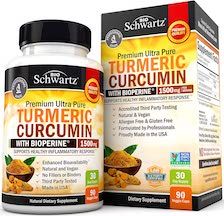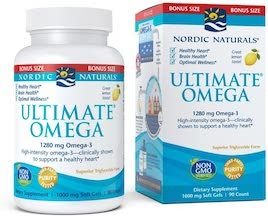Inflammaging: Are You Suffering from Chronic Inflammation and Aging?

Aging brings wrinkles, vision changes, and frequent aches and pains, but there are ways to slow down the effects. But there’re other signs you’re getting old — chronic inflammation. And, although you cannot see or feel it, inflammation speeds up the aging process. It’s a phenomenon common to most aged individuals.
Researchers are finding that chronic inflammation isn’t caused by infections or illnesses. And yet, it may shorten our lifespans and the quality of our life. It’s been linked to several inflammatory diseases that most people associate with aging.
These include age-related macular degeneration (AMD), Alzheimer’s disease (AD), atherosclerosis, cancer, heart disease, osteoporosis and other chronic diseases. We’ll take a deeper look at what causes inflammaging and explore ways to minimize its impact.
What Causes Inflammaging?
Healthy inflammation is a balance between too much and too little inflammation. As we get older, our immune systems launch an inflammatory immune responses to help repair damaged tissue and fight off viruses or bacteria. Once the threat is eliminated, the inflammation usually goes away until it’s necessary again.
With age, the body’s ability to control inflammation diminishes. An aging immune system triggers an inflammation response on an ongoing basis, even though you don't need it right now. As a result, your immune system becomes less effective in fighting off diseases.
What Contributed to Inflammaging?
Many common lifestyle habits are proinflammatory, starting with what we eat. Most of the food we buy at our local grocery stores is not only low in nutrients but also loaded with additives, pesticides, pro-inflammatory oils, and sugars.
Ultra-processed food items (like chips, cookies, frozen meals, and pastries) often contain unhealthy oils like corn, safflowers, sunflowers, soy, canola and vegetable oil. Omega-6 fatty acids are pro-inflammatory, whereas omega-3 fatty acids are anti-inflammatory.
Sugar and refined grains can increase inflammation because they cause an immediate rise in blood sugar. This, in turn, causes an increase in the fats that cause inflammation. Interleukin-6 also stimulates the production of insulin, which causes inflammation in the body.
If that weren't bad enough, the extra sugar in our blood cross-links with protein to form Advanced Glycation End Products (AGEs), which cause even more inflammation in the obese individuals.
We're also stoking low-grade inflammation responses by consuming foods that contain pesticides and herbicides. Studies show that pesticides affect proinflammatory cytokines levels, which are a type secreted by immune cells. One of the biggest culprits of this effect is glyphosate (also known as Roundup).
Glyphosate is found in a large number of conventionally grown fruits and vegetables and nearly all ultra-processed foods. It’s not just about what we eat. Sitting in front of a screen for too long promotes inactivity, which can also contribute to excess inflammation.
Here’s the reason: Lack of physical activity causes the accumulation of visceral fat – the fat that’s stored in the adipose tissue of the abdominal cavity. Unlike the fat in your arms and legs, visceral (belly) fat is active and can cause inflammation.
Other factors can also cause chronic low-grade inflammation, including exposure to toxins from everyday items like cosmetics and household cleaners, smoking or exposure to passive smoking, overindulging in alcohol, and frequent infections,
Fortunately, many of the factors that affect our health are within our control. Making healthy changes can help reduce chronic low-grade inflammation and may even help slow down the aging and age-related diseases.
Reduce Inflammation as You Age
If you've ever twisted your ankle, cut your finger, or been stung by an insect, then you've probably experienced inflammation. Even illnesses like the common cold or influenza cause inflammation in your body.
But did you know inflammation increases with age? The good news is you can control inflammation as you age. A few simple changes to your lifestyle and diet can improve your overall health.
Anti-Inflammatory Life
While it’s essentially impossible to eliminate all unhealthy inflammation in the human body, there are six effective ways to limit its impact.
- Adopt an anti-inflammatory diet. Trade-in ultra-processed food and foods filled with refined sugars for a low-carb, high-fat diet (less than 100 grams of carbohydrates per day). Eating antioxidant-rich foods, such as fruits and vegetables, fish, nuts, and whole grains, can help lower inflammation. Alcohol consumption should be kept at a low-to-moderate level.
- Choose organic and wild-caught. Reduce the exposure to agricultural chemicals by choosing organic dairy, produce, grassfed meats, and poultry. Wild-caught seafood is usually better than farmed seafood.
- Eat less and less often. Recent research in the journal Nutrients reports that calorie restriction and intermittent fasts help the body fight off infections, lower inflammation, and promote autophagy—the process by which the body cleans out damaged cells so that new ones can be regenerated.
- Exercise regularly to lower chronic inflammation and boost your immune system. Weight lifting, in particular, helps maintain muscle mass and bones strong, even in older people. Try to get at least 30 min of physical activity every day of the week.
- Use clean products. Many of the ingredients in cosmetics and personal care products and household cleaners cause inflammation and contribute to inflammaging. Try to use chemical-free products whenever possible, but be sure to check the label to ensure the product is indeed nontoxic.
- Avoiding tobacco smoke and other environmental toxins is important. Exposure to particulate matter in air pollutants is harmful.
Anti-Inflammatory Supplement
Cleaning up your life can go a long way toward preventing or possibly even reducing inflammation. But adding these additional nutrients to your anti-inflammatory arsenal can provide even more support.
Turmeric Curcumin with BioPerine

Derived from the root of the Curcuma longa plant, curcumin is an anti-inflammatory and antioxidant compound that has been used for centuries in traditional medicine. Inflammaging is a condition in which chronic inflammation causes aging.
Because of its ability to suppress inflammatory processes, turmeric may be an effective anti-aging agent. Researchers at the University of North Carolina found that curcumin has an anti-inflammatory response on the brain, and as a result, may slow age-related cognitive decline in older adults. Curcumin is effective at protecting against diabetes, cardiovascular disease, and other age-related chronic inflammation, while also strengthening the body’s immunity.
There’s just one problem. Curcumin supplements aren't readily absorbed by the body because they're not standardized. Fortunately, one specific proprietary form of the compound BCM 95 provides significantly better absorption than others. By grinding turmeric into very fine particles and combining them with turmeric, this specific form of turmeric yields a more potent and more effective supplement.
Nordic Naturals Ultimate Omega-3

Omega 3 found in cold-water fish are beneficial fats with antiinflammatory properties thanks to two types of fatty acids — DHA and EPA. Omega-3 fatty acids may help prevent chronic inflammation, but a new study found that they work differently than previously thought.
Turns out that DHA is superior to EPA at reducing pro-inflammatory proteins in the body. However, EPA improves your body’s ability to balance pro-and anti-inflammatory proteins and regulates your immune system. These two omega-3 fats may help protect against age-related inflammation.
But, just like turmeric, the form you take can be important. Omega-3 supplements often use less than optimal sources of fish oil to supply DHA and EPA, which may be rancid. To get the most out of your omega-3 supplement you want to look for one that contains fish oil bound to phospholipid for better absorption and peptide to support healthy cell membranes
OPCs. Technically known as oligomerized proanthocyanidin, these polyphenols are found in grape seeds. OPCs are primarily known for their antioxidant power, but recent studies have found that they also boast powerful anti-inflammatory properties.
It may be why research in the journal In Vivo suggests that OPCs can help improve several age-related diseases including rheumatoid arthritis, COPD, and some coronary artery disease. Many supplements contain OPCs containing tannins with a high molecular weight, but some do not. They're hard to digest. To get the best results from your supplement, look for one that doesn't contain any tannins and only contains low molecular weight OPC.

Bacteria in the gut are known for playing a role in inflammation, particularly in the elderly. Aging causes the microbiome to become imbalanced, which increases the risk of inflammaging.
The good news is supplementing with probiotics may help restore balance to your gut microbiome. One small study of older adults found that a certain kind of bacteria called Lactobacillus rhamosus increased butyrate, which helps support the immune system and acts as an anti-inflammatory.
But it’s not the only type of good bacteria with anti-inflammatory properties. Lactobacillus plantar and Bifidobacteriumbifidum also have powerful anti-inflammatory properties. Look for a probiotics supplement containing at least 20 billion live active CFUs of these 3 strains to support balanced gut flora and a healthy inflammatory response
Top 10 anti-inflammatory foods:
- Avocados
- Berries (blackberries, blueberries, raspberries, strawberries)
- Broccoli
- Cherries
- Dark chocolate
- Extra virgin olive oil
- Fatty fish (anchovies, halibut, mackerel, salmon, tuna)
- Mushrooms
- Tomatoes
- Turmeric (Curcumin)
Conclusion
Ideally, inflammation should resolve quickly after the pathogen has been eliminated and the insult to the tissue has been repaired. Low-grade persistent inflammation is a natural part of aging, but if it becomes chronic, it can lead to serious health issues.
There is strong evidence suggesting that the development of age related multi-factorial conditions like cancer, cardiovascular disease, dementia, type 2 diabetes, frailty, and sarcopenia is associated with low-level elevations of C-reactive protein, which are markers of inflammation.

